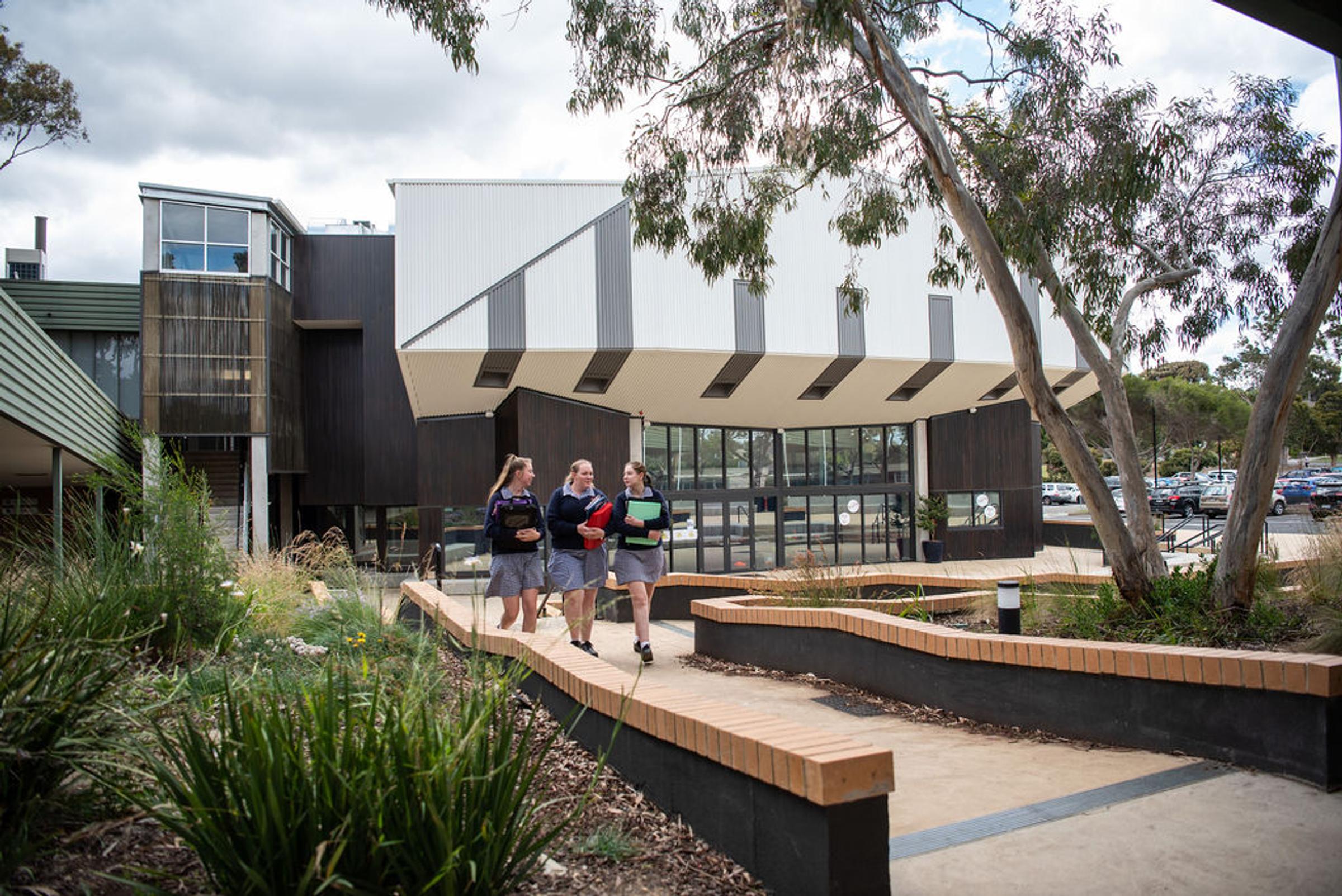VCE Languages

VCE Languages Subject Options |
|---|
German |
Japanese |
German
Course Description
This course has been designed for students who have previously studied 3 - 4 years of German.
The study of German contributes to student personal development in a range of areas including communication skills, intercultural understanding, cognitive development, literacy and general knowledge. Learning a language engages analytical and reflective capabilities and enhances critical and creative thinking. The ability to communicate in German may, in conjunction with other skills, provide students with enhanced vocational opportunities in areas such as trade, environmental studies, tourism, banking, technology and education.
Units 1 and 2 German focus on student participation in interpersonal communication, interpreting the language of other speakers, and presenting information and ideas in German on a range of themes and topics. Students develop and extend skills in listening, speaking, reading, writing and viewing in German in a range of contexts and develop cultural understanding in interpreting and creating language. Students develop their understanding of the relationships between language and culture in new contexts and consider how these relationships shape communities. Throughout the study students are given opportunities to make connections and comparisons based on personal reflections about the role of language and culture in communication and in personal identity.
Unit 1
This unit will investigate the prescribed themes and topics, text types, kinds of writing, vocabulary and grammar as detailed in the VCE Study Design for German.
There are three prescribed themes for study in VCE German:
- The individual: Personal identity and lifestyles / Relationships, Aspirations, education and careers – Youth Culture
- The German-speaking Communities: Lifestyles in German-Speaking Countries and Communities – Germans in Australia
- The German-speaking Communities: Cultural Heritage – German celebrations.
Unit 2
This unit will investigate the prescribed themes and topics, text types, kinds of writing, vocabulary and grammar as detailed in the VCE Study Design for German.
There are three prescribed themes for study in VCE German:
- The Individual: Personal identity and lifestyles - Drugs in Sport
- The German-Speaking Communities: Historical and contemporary perspectives – The Romantics
- The World Around Us: Global and contemporary society: Eating and Drinking Green.
Unit 3
This unit will investigate prescribed themes and topics, text types, kinds of writing, vocabulary and grammar as detailed in the VCE Study Design for German.
Areas of Study:
- The Individual: Aspirations, education and careers – The Job Interview
- The German-speaking Communities: Lifestyles in German-Speaking Countries and Communities – Germans in Australia
- The German-speaking Communities: Cultural Heritage – German celebrations.
Unit 4
This unit will investigate prescribed themes and topics, text types, kinds of writing, vocabulary and grammar as detailed in the VCE Study Design for German. It includes a detailed study based on one of the recommended sub-topics within the Study Design.
Areas of Study:
- The Individual: Personal identity and lifestyles - Drugs in Sport
- The German-Speaking Communities: Historical and contemporary perspectives – The Romantics
- The World Around Us: Global and contemporary society: Eating and Drinking Green.
Additional Information: Students are expected to able to use a bilingual dictionary effectively in exam and classroom situations.
Prerequisites: In order to study Units 3 and 4, students should have successfully completed Units 1 and 2 or equivalent level of accomplishment to have a reasonable chance of success in these Units.
For further information: https://www.vcaa.vic.edu.au/curriculum/vce/vce-study-designs/german/Pages/Index.aspx
Japanese
Course Description
This course has been designed for students who have previously studied 3 to 4 years of Japanese. VCE Japanese Second Language focuses on student participation in interpersonal communication, interpreting the language of other speakers, and presenting information and ideas in Japanese on a range of themes and topics. Students develop and extend skills in listening, speaking, reading, writing and viewing in Japanese in a range of contexts and develop cultural understanding in interpreting and creating language.
Students develop their understanding of the relationships between language and culture in new contexts and consider how these relationships shape communities. Throughout the study, students are given opportunities to make connections and comparisons based on personal reflections about the role of language and culture in communication and in personal identity.
The study of Japanese contributes to student personal development in a range of areas including communication skills, intercultural understanding, cognitive development, literacy and general knowledge. Learning and using an additional language encourages students to examine the influences on their perspectives and society, and to consider issues important for effective personal, social and international communication. It enables students to examine the nature of language, including their own, and the role of culture in language, communication and identity. By understanding the process of language learning, students can apply skills and knowledge to other contexts and languages. Learning a language engages analytical and reflective capabilities and enhances critical and creative thinking.
The study of Unit 1 and 2 Japanese provides students with the ability to understand and use a language that is spoken by approximately 128 million people worldwide. Japanese is a phonetic language with predictable and systematic grammar rules. Three scripts: hiragana, katakana and kanji are used for writing. Japanese grammar is relatively uniform, with few irregularities, no grammatical gender, and predictable and systematic conjugation of adjectives and verb tenses. There are some differences between the elements and patterns in Japanese and English, such as word order. Japanese cultural values are expressed in the system of plain and polite forms, which reflect hierarchical relations, social and business-related positioning and rules about respect and status.
Unit 1
This unit will investigate prescribed themes and topics, text types, kind of writing, vocabulary and grammar as detailed in the VCE Study Design for Japanese.
Areas of Study:
- Interpersonal communication - On completion of this unit the student should be able to exchange meaning in a spoken interaction in Japanese.
- Interpretive communication - On completion of this unit the student should be able to interpret information from two texts on the same subtopic presented in Japanese, and respond in writing in Japanese and in English.
- Presentational communication - On completion of this unit the student should be able to present information, concepts and ideas in writing in Japanese on the selected subtopic and for a specific audience and purpose.
- Prescribed themes, topics and suggested sub-topics:
- The individual - Personal identity and lifestyles, Relationships, Aspirations, education and careers
- The Japanese speaking communities – The Japanese-speaking communities, significant people, living in a Japanese community/visiting Japan
- The world around us - Global and contemporary society, Communication and media, the influence of technology.
Unit 2
This unit will investigate prescribed themes and topics, text types, kinds of writing, vocabulary and grammar as detailed in the VCE Study Design for Japanese.
Areas of Study:
- Interpersonal communication - On completion of this unit the student should be able to respond in writing in Japanese to spoken, written or visual texts presented in Japanese.
- Interpretive communication - On completion of this unit the student should be able to analyse and use information from written, spoken or visual texts to produce an extended written response in Japanese.
- Presentational communication - On completion of this unit the student should be able to explain information, ideas and concepts orally in Japanese to a specific audience about an aspect of culture within communities where Japanese is spoken.
Prescribed themes, topics and suggested sub-topics:
- The individual - Personal identity and lifestyles, Relationships, Aspirations, education and careers
- The Japanese speaking communities – The Japanese-speaking communities, significant people, living in a Japanese community/visiting Japan
- The world around us - Global and contemporary society, communication and media, the influence of technology
Unit 3
This unit will investigate prescribed themes and topics, text types, kinds of writing, vocabulary and grammar as detailed in the VCE Study Design for Japanese.
Areas of Study:
- Interpersonal communication - On completion of this unit the student should be able to participate in a spoken exchange in Japanese to resolve a personal issue.
- Interpretive communication - On completion of this unit the student should be able to interpret information from texts and write responses in Japanese.
- Presentational communication - On completion of this unit the student should be able to express ideas in a personal, informative or imaginative piece of writing in Japanese.
Prescribed themes, topics and suggested sub-topics:
- The individual - Personal identity and lifestyles, Relationships, Aspirations, education and careers
- The Japanese speaking communities – The Japanese-speaking communities, significant people, living in a Japanese community/visiting Japan
- The world around us - Global and contemporary society, communication and media, the influence of technology
Unit 4
This unit will investigate prescribed themes and topics, text types, kinds of writing, vocabulary and grammar as detailed in the VCE Study Design for Japanese. It includes a detailed study based on one of the recommended sub- topics within the Study Design.
Areas of Study:
- Interpersonal communication - On completion of this unit the student should be able to share information, ideas and opinions in a spoken exchange in Japanese.
- Interpretive communication - On completion of this unit the student should be able to analyse information from written, spoken and viewed texts for use in a written response in Japanese.
- Presentational communication - On completion of this unit the student should be able to present information, concepts and ideas in evaluative or persuasive writing on an issue in Japanese.
Prescribed themes, topics and suggested sub-topics:
- The individual - Personal identity and lifestyles, Relationships, Aspirations, education and careers
- The Japanese speaking communities – The Japanese-speaking communities, significant people, living in a Japanese community/visiting Japan
- The world around us - Global and contemporary society, communication and media, the influence of technology
Additional Information:
Students are expected to be able to use a bilingual dictionary effectively in exams and in the classroom.
Prerequisites: In order to study Units 3 and 4, students should have successfully completed Units 1 and 2 or equivalent level of accomplishment to have a reasonable chance of success in these Units.
For further information: https://www.vcaa.vic.edu.au/curriculum/vce/vce-study-designs/japanesesecondlanguage/Pages/Index.aspx
